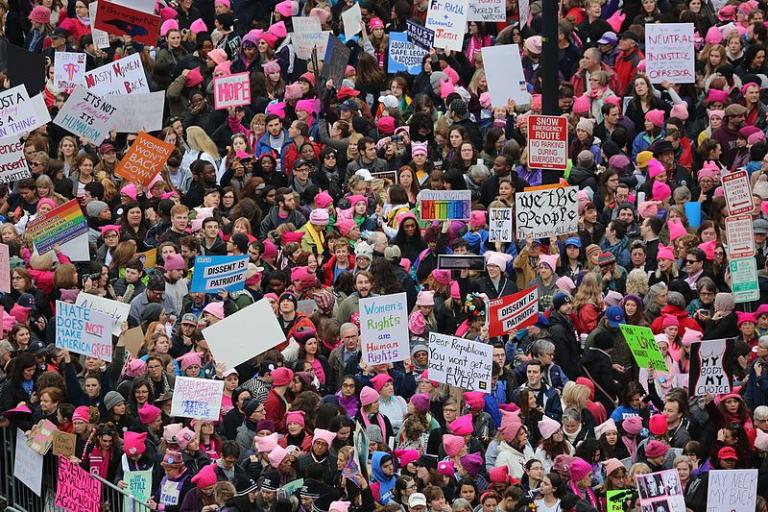What does it take to be a feminist? Does identifying as a feminist automatically make you one?
I’ve been pondering this for some time, and the question came up again, when a friend shared about an experience she had with a self-identified pro-life feminist who posted that women should “keep your legs together or just raise your kids” – in reference to the plight of women in crisis pregnancies.
Now, I am a feminist, and have identified as pro-life my entire life. Conversations like that, however, remind me of why I’ve become so uncomfortable with the pro-life label lately, since it seems to be associated more with controlling women than with implementing policies that could actually save lives.
But it’s not the pro-life label I want to address here. It’s the feminist label. Can a woman go around saying things like that to other women, and still be a feminist? Is calling yourself a feminist all you have to do in order actually to be one?
Does “feminist” even mean anything?
There’s a lot of ignorance and confusion around the word “feminism” in popular circles, but that’s often because people haven’t even bothered to educate themselves, and prefer to have conversations about imaginary or “straw feminists,” using talking points drawn from sexists in right-wing media rather than referring directly to any actual statements of actual feminist writers or activists.
There’s also a justifiable confusion, however, because if you approach feminism anticipating a monolithic ideology you will find yourself, instead, facing a complex polyphony of voices from different times, cultures, and ideological places. You will not find a single “feminism” but rather many “feminisms.” And feminism being a praxis and an activism as well as a theory or ideology, you will see it lived out in as many diverse ways as there are diverse women. Oh, and men, if you grant that men can be feminists too (and I believe they can – and have even learned valuable insights from my male feminist friends).
So has feminism become so variegated as to have lost any unifying principle – to the point that anything goes, when it comes to applying the label?
Not at all. There are threads of unity and continuity running among the many diverse feminisms out there. Being a feminist means recognizing the historic reality of patriarchy, legal male dominance, and systemic gender inequality. It means believing that this inequality is wrong, and must be rectified. And it means, lastly, situating oneself within a community of feminists who have been working to right this wrong, even if there is disagreement or uncertainty about how best to achieve justice – or what justice must necessarily entail.
Varieties of feminism include Black feminism (or Womanism), Marxist feminism, liberal feminism, radical feminism, eco-feminism, and more, depending on which taxonomy you prefer. Some view the development of feminism over history as occurring in a series of “waves” – First Wave, Second Wave, Third Wave, and – maybe? – a Fourth Wave as well?
There are many, many different ways to be a feminist. But that there’s not just one way doesn’t mean that anything goes.
Whichever way you slice it though, you will still find these same trends of recognizing oppression for what it is, opposing it, and doing so within a broader community.
I want to stress this last one, about community. Because, up until about two years ago, I didn’t realize how important it was.
Up until then, I thought that in order to be a feminist one needed only to recognize the injustice of the patriarchy, and work for equality.
What happened two years ago? Well, the first Women’s March happened. It was the largest single-day protest in US history, and it brought together women of many different ethnicities, religious backgrounds, and political stances. And yes, pro-life feminists attended too, initiating what I think has been a fruitful though sometimes contentious debate about what being a “pro-life feminist” entails.
Many pro-choice feminists are wary of the idea – and, I think, rightly so. This is not only because “pro-life” has come to be associated intimately with a right-wing ideology that is inherently sexist. It’s also because it has no become popular, or even cute, for women to call themselves “feminists” while opposing all other feminist movements, and perpetuating the same structures of injustice, objectification, and dehumanization that women have been opposing for generations. Yes, there are pro-life feminists. But there are also pro-lifers who pretend to be feminists, and aren’t.
Calling yourself a feminist and saying “women should just keep their legs together” is a prime example of this.
Standing against the sisterhood
At the time of the first Women’s March, I saw a number of conservative women deriding those participating in it as “not real women” or even “not real feminists.” They upheld the March for Life as the “real Women’s March,” ignoring the many legitimate grievances of the many women who came together on that day, bridging many ideological gaps – including disagreement over abortion – to unite in a common cause, against the systemic sexism and institutionalized misogyny of which Trump is just a symptom, not a cause – and which is especially evident in the way men, especially powerful white men, get away with preying on women.
I’m sorry, but if you don’t just differ on certain points, but in fact stand totally against the vast collective of diverse women who are advocating for equality – if you deride them as “not real women” or “fake feminists” – you are not a feminist.
If you reduce women to means to the end of reproduction, you are not a feminist.
It you deny women any kind of reproductive and sexual agency, you are not a feminist.
If you slut-shame single mothers, and ignore the extreme gender inequality of the relations between men and women, you are not a feminist.
Sure, you can twist the terms all you want and say “the real oppression of women is _____” – and fill in the blank with “that they think they have to be like men to succeed” or “that they have been brainwashed into working outside the home” or “that they don’t embrace their true vocation as mothers.”
The straw feminist problem
You can pretend that feminists are these caricatures of ourselves. Forget about the fact that actually no, for the most part feminists do not think we should be like men, in any way. Forget about the fact that we recognize that staying at home is a legitimate choice – emphasis on choice. So is motherhood. Ignore the fact that feminists are advocating for greater workplace protections for mothers, for better medical care for mothers, for protection from abuse for mothers. Just keep beating down those straw feminists Rush Limbaugh warned you about.
You can even twist the whole paradigm so that what you mean by “feminism” is in fact “patriarchy,” and what you’re saying is better for women is, that we should just go back to the way things were before. You can call yourself the real feminist while you work to undo all the accomplishments of our sisters and our mothers, who labored tirelessly for justice.
You can say it. But that won’t make it be so.
You’re not a feminist, you’re just appropriating the term and making it a tool of male dominance.
image credit: https://commons.wikimedia.org/wiki/File:Women%27s_March_2017-01_(04).jpg













